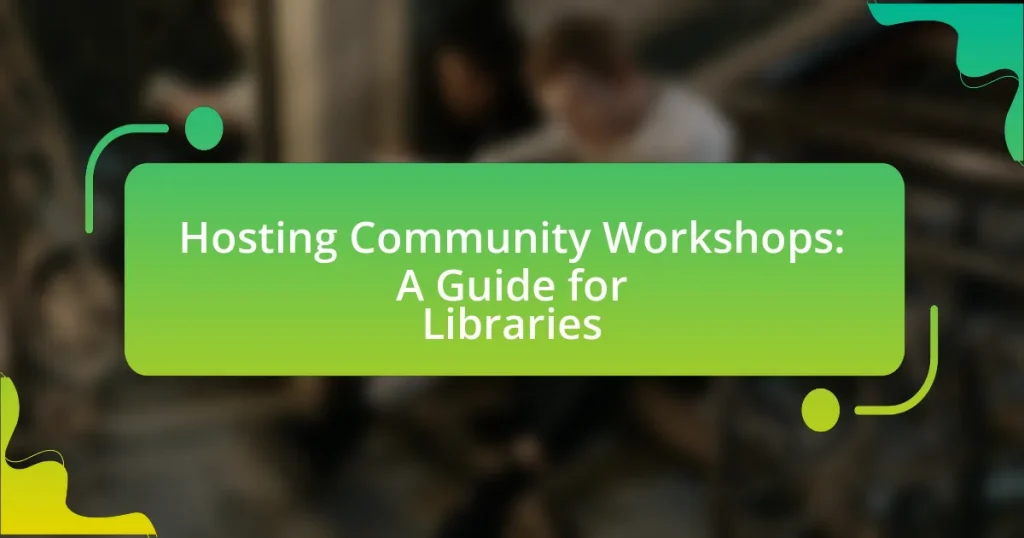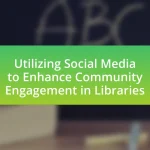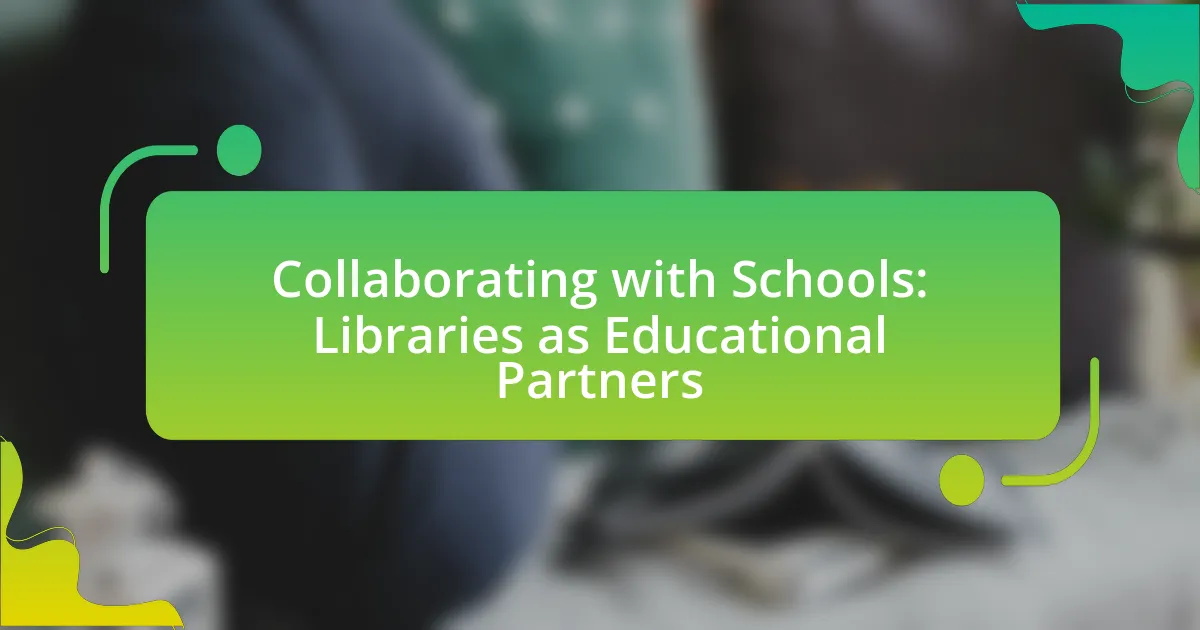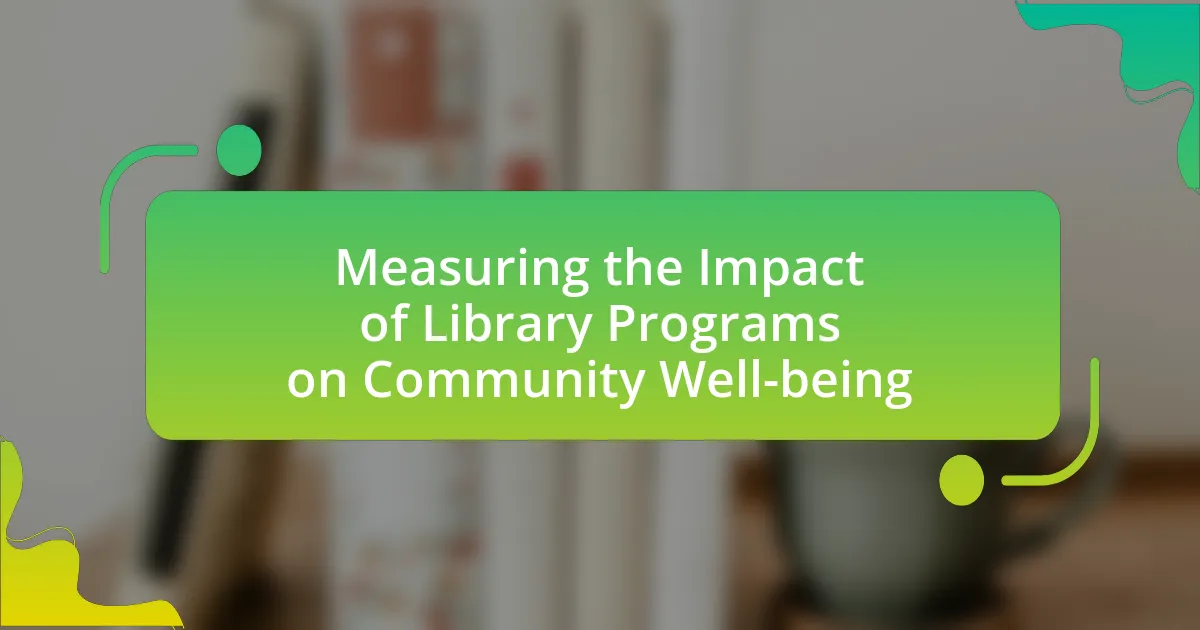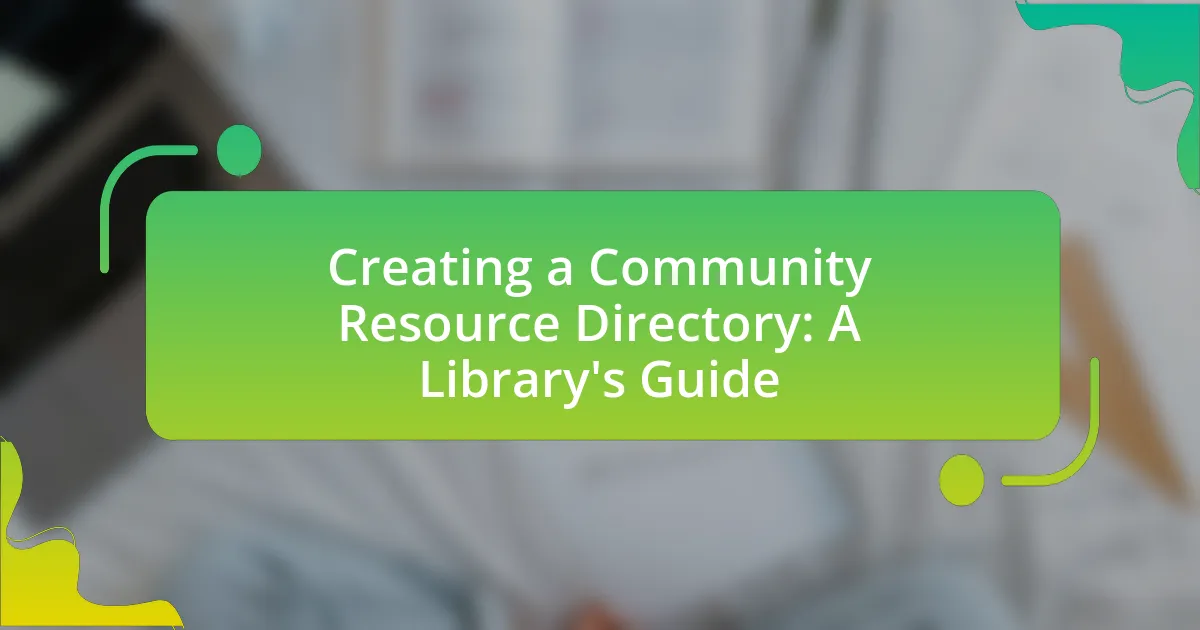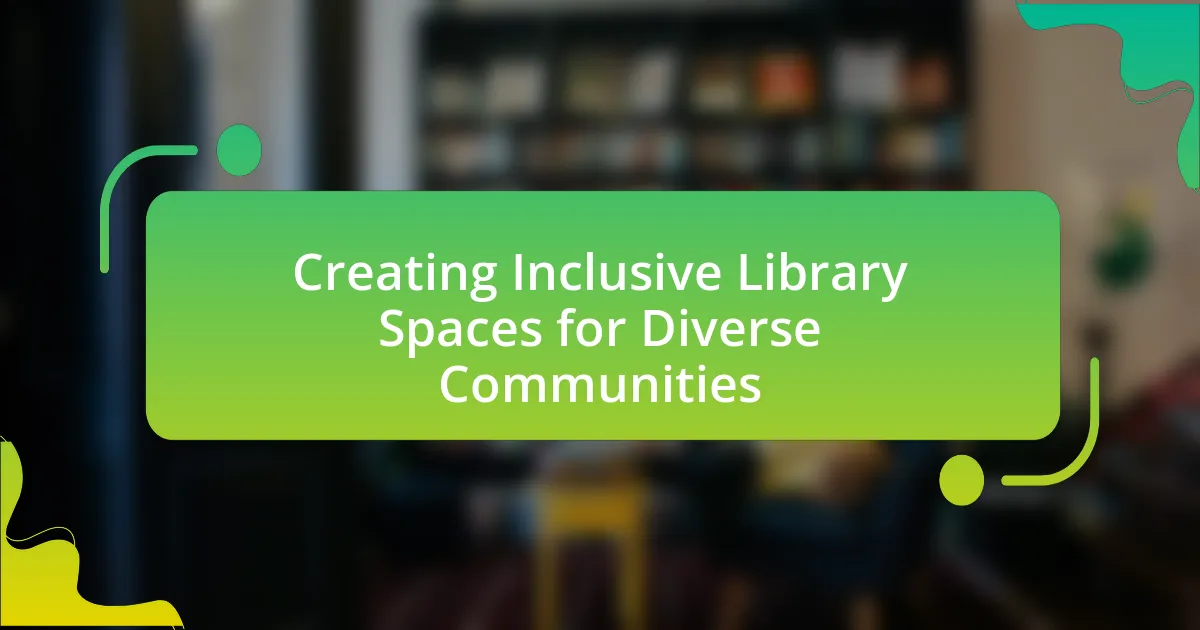Community workshops in libraries serve as organized events that facilitate learning, skill-sharing, and community engagement across various topics such as technology, arts, and personal development. These workshops enhance library services by increasing foot traffic and fostering a sense of belonging among residents. Libraries are ideal venues for such workshops due to their accessibility and available resources, which support diverse learning formats. The article outlines key steps for planning successful workshops, methods for assessing community needs, and strategies for promoting events to maximize participation, while also addressing common challenges libraries face in hosting these initiatives.
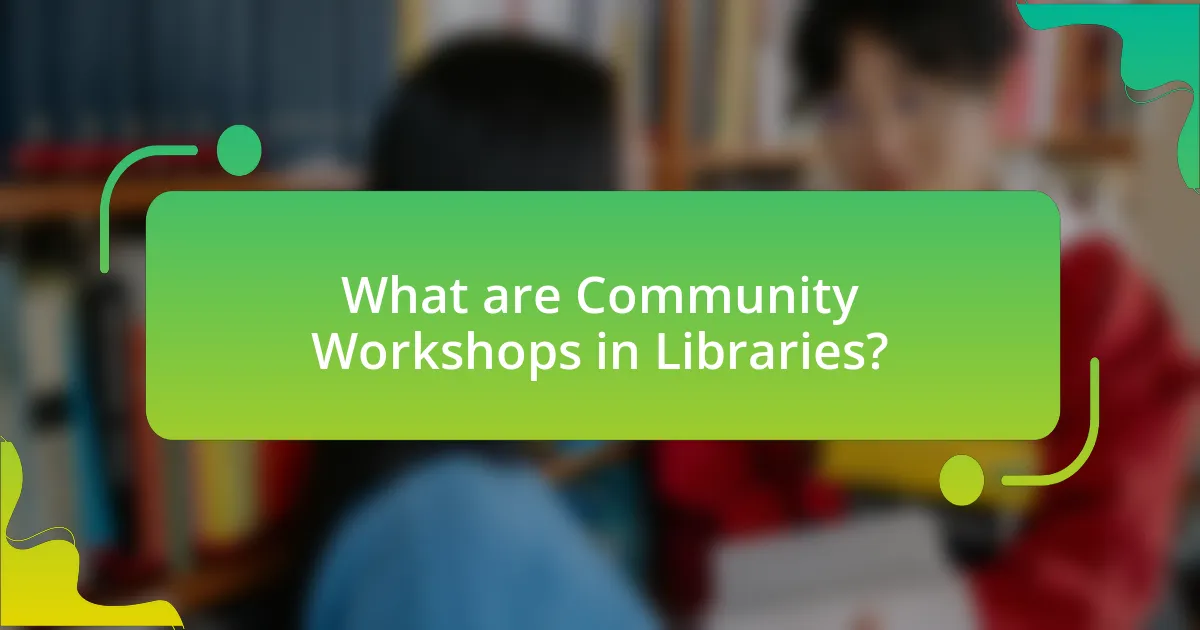
What are Community Workshops in Libraries?
Community workshops in libraries are organized events that provide a space for individuals to learn, share skills, and engage with their community. These workshops often cover a variety of topics, including technology, arts and crafts, health, and personal development, aiming to foster collaboration and knowledge exchange among participants. Libraries serve as accessible venues for these workshops, promoting lifelong learning and community engagement, which is supported by the American Library Association’s emphasis on libraries as community hubs for education and social interaction.
How do community workshops benefit libraries?
Community workshops benefit libraries by enhancing community engagement and fostering a sense of belonging among residents. These workshops provide a platform for local individuals to share skills, knowledge, and experiences, which in turn attracts more visitors to the library. According to a study by the American Library Association, libraries that host community workshops report a 30% increase in foot traffic and a 25% increase in program participation. This increased engagement not only boosts library usage but also strengthens community ties, making libraries vital hubs for social interaction and learning.
What types of community engagement do these workshops promote?
These workshops promote various types of community engagement, including collaborative learning, skill-sharing, and social interaction. Collaborative learning occurs as participants work together on projects, enhancing their knowledge and fostering a sense of community. Skill-sharing allows individuals to teach and learn from one another, creating a supportive environment that values diverse expertise. Social interaction is facilitated through group activities, which help build relationships among community members, ultimately strengthening community ties.
How can workshops enhance library services?
Workshops can enhance library services by providing targeted educational opportunities that meet community needs. These workshops facilitate skill development, promote digital literacy, and foster community engagement, thereby increasing library usage and relevance. For instance, a study by the American Library Association found that libraries offering workshops saw a 30% increase in patron attendance and a 25% rise in program participation, demonstrating the positive impact of such initiatives on library services.
Why are libraries ideal venues for community workshops?
Libraries are ideal venues for community workshops because they provide accessible spaces that foster learning and collaboration. These public institutions often have dedicated rooms equipped with necessary resources such as technology, seating, and materials, which support various types of workshops. Additionally, libraries are centrally located and free to use, making them convenient for community members to attend. According to the American Library Association, 90% of libraries offer programming that engages the community, highlighting their role as hubs for education and social interaction.
What resources do libraries offer for hosting workshops?
Libraries offer various resources for hosting workshops, including meeting rooms, technology equipment, and instructional materials. Meeting rooms provide a dedicated space for workshops, often equipped with seating and presentation tools. Technology equipment, such as projectors, computers, and audio-visual systems, enhances the workshop experience by facilitating presentations and interactive sessions. Additionally, libraries may offer access to instructional materials, including books, handouts, and online resources, which support the content of the workshops. These resources enable libraries to effectively engage their communities and provide valuable learning opportunities.
How do libraries foster a sense of community through workshops?
Libraries foster a sense of community through workshops by providing a space for individuals to gather, learn, and share experiences. These workshops often cover diverse topics, such as technology, arts, and literacy, which cater to various interests and demographics within the community. For instance, a study by the American Library Association found that 76% of libraries offer programs that encourage community engagement, highlighting their role as vital social hubs. By facilitating interactions among participants, libraries help build relationships and networks, ultimately strengthening community ties.
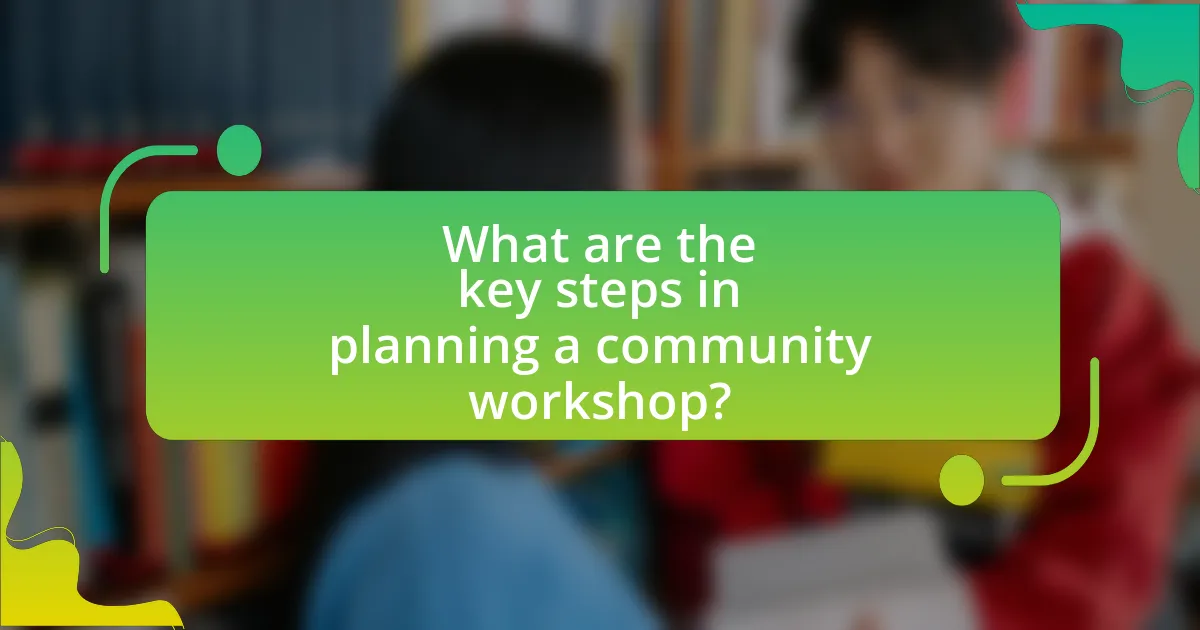
What are the key steps in planning a community workshop?
The key steps in planning a community workshop include defining the workshop’s purpose, identifying the target audience, selecting a suitable venue, creating an agenda, promoting the event, and evaluating its success afterward. Defining the workshop’s purpose ensures clarity on the goals and objectives, while identifying the target audience helps tailor the content to their needs. Selecting a suitable venue is crucial for accessibility and comfort, and creating an agenda outlines the structure and flow of the workshop. Promoting the event through various channels increases participation, and evaluating its success through feedback allows for improvements in future workshops.
How do you identify the needs of the community?
To identify the needs of the community, libraries can conduct surveys and hold focus groups to gather direct feedback from residents. These methods allow libraries to collect specific data on community interests, challenges, and preferences, ensuring that programming aligns with actual needs. For example, a study by the American Library Association found that libraries that engage in community assessment activities are more effective in tailoring their services, leading to increased patron satisfaction and participation.
What methods can be used to gather community input?
Methods to gather community input include surveys, focus groups, public meetings, and online forums. Surveys allow for quantitative data collection from a broad audience, while focus groups provide qualitative insights through in-depth discussions. Public meetings facilitate direct interaction between community members and organizers, fostering open dialogue. Online forums enable asynchronous communication, allowing participants to share thoughts at their convenience. These methods are effective as they engage diverse community members and ensure a range of perspectives are considered in decision-making processes.
How can libraries assess the interests of potential participants?
Libraries can assess the interests of potential participants by conducting surveys and focus groups. Surveys can be distributed both online and in-person to gather quantitative data on community preferences, while focus groups allow for in-depth discussions that reveal qualitative insights. Research indicates that libraries that engage with their communities through these methods can better tailor their programs to meet specific needs, as evidenced by a study from the American Library Association, which found that libraries that regularly assess community interests see a 30% increase in program attendance.
What logistical considerations are involved in hosting a workshop?
Hosting a workshop involves several logistical considerations, including venue selection, equipment needs, scheduling, and participant registration. The venue must accommodate the expected number of attendees and be accessible, while equipment such as projectors, microphones, and seating arrangements must be arranged in advance to ensure a smooth experience. Scheduling is critical; it should align with the availability of both facilitators and participants, often requiring consideration of local events or holidays. Additionally, participant registration processes must be established to manage attendance effectively, which can include online sign-ups or in-person registration. These logistical elements are essential for the successful execution of a workshop, as they directly impact participant engagement and overall satisfaction.
How do you select an appropriate venue within the library?
To select an appropriate venue within the library, assess the space based on the specific needs of the workshop, including capacity, accessibility, and available resources. The venue should accommodate the expected number of participants comfortably, ensuring that it is accessible to individuals with disabilities. Additionally, consider the availability of necessary equipment such as projectors, seating arrangements, and technology support. Libraries often have designated spaces for events, which can be reserved based on these criteria, ensuring that the selected venue aligns with the goals of the community workshop.
What materials and resources are necessary for a successful workshop?
A successful workshop requires essential materials and resources such as presentation equipment, printed handouts, writing supplies, and a suitable venue. Presentation equipment includes projectors and screens for visual aids, which enhance understanding and engagement. Printed handouts provide participants with reference materials, ensuring they can follow along and retain information. Writing supplies, such as pens and notebooks, facilitate note-taking and active participation. A suitable venue must accommodate the expected number of participants and provide a comfortable learning environment, which is crucial for fostering interaction and collaboration. These components collectively contribute to an effective workshop experience.
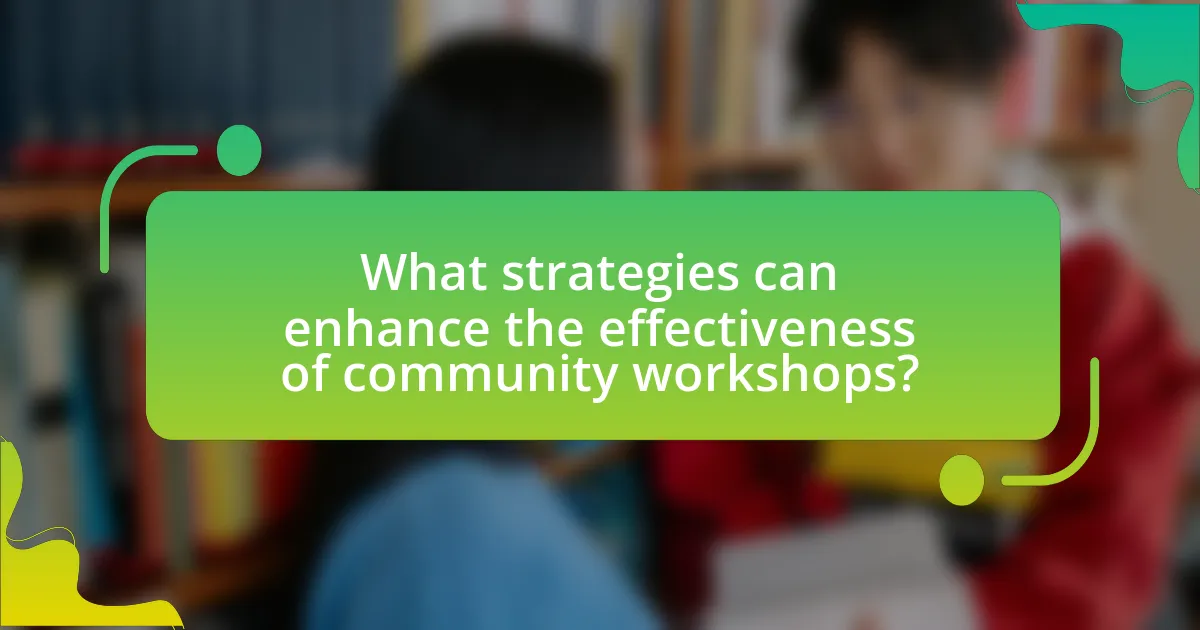
What strategies can enhance the effectiveness of community workshops?
To enhance the effectiveness of community workshops, libraries should implement strategies such as engaging local stakeholders, utilizing interactive formats, and providing follow-up resources. Engaging local stakeholders ensures that the workshop content is relevant and tailored to community needs, which increases participation and interest. Utilizing interactive formats, such as hands-on activities or group discussions, fosters collaboration and deeper learning among participants. Providing follow-up resources, such as access to materials or additional support, reinforces the workshop’s impact and encourages ongoing community involvement. Research indicates that workshops with interactive elements see a 30% increase in participant satisfaction and retention of information, demonstrating the effectiveness of these strategies.
How can libraries promote their workshops to the community?
Libraries can promote their workshops to the community by utilizing multiple channels such as social media, local newspapers, community bulletin boards, and partnerships with local organizations. For instance, libraries can create engaging posts on platforms like Facebook and Instagram to reach a wider audience, as studies show that 69% of adults in the U.S. use social media, making it an effective tool for outreach. Additionally, distributing flyers in community centers and schools can directly target potential participants. Collaborating with local businesses and organizations can also enhance visibility, as these partnerships can lead to cross-promotion, increasing attendance.
What channels are most effective for outreach and marketing?
The most effective channels for outreach and marketing in the context of hosting community workshops at libraries are social media, email newsletters, and community partnerships. Social media platforms like Facebook and Instagram allow libraries to reach a broad audience and engage with community members through targeted ads and event promotions. Email newsletters provide direct communication to subscribers, ensuring that information about workshops reaches interested individuals. Community partnerships with local organizations and schools enhance visibility and credibility, as these entities can help promote events to their networks. According to a 2021 survey by the American Library Association, 70% of libraries reported using social media as a primary outreach tool, highlighting its effectiveness in engaging the community.
How can partnerships with local organizations improve attendance?
Partnerships with local organizations can significantly improve attendance by leveraging their established networks and community trust. When libraries collaborate with local organizations, they can tap into existing audiences who are already engaged with those organizations, thereby increasing visibility and interest in library events. For instance, a study by the American Library Association found that libraries that partnered with schools and community groups saw a 30% increase in event attendance, as these organizations promoted the events to their members. This collaboration not only enhances outreach but also fosters a sense of community ownership and participation, making individuals more likely to attend library workshops.
What are best practices for facilitating engaging workshops?
Best practices for facilitating engaging workshops include setting clear objectives, encouraging participant interaction, and utilizing diverse teaching methods. Clear objectives guide the workshop’s focus, ensuring that participants understand the goals and outcomes. Encouraging interaction, such as through group discussions or hands-on activities, fosters a collaborative environment and keeps participants engaged. Utilizing diverse teaching methods, including visual aids, storytelling, and technology, caters to different learning styles and maintains interest. Research indicates that workshops incorporating interactive elements can increase retention and satisfaction rates among participants, highlighting the effectiveness of these practices.
How can facilitators encourage participation and interaction?
Facilitators can encourage participation and interaction by creating an inclusive environment that values every participant’s input. This can be achieved through techniques such as using open-ended questions, actively listening, and providing positive reinforcement. Research indicates that when facilitators employ strategies like small group discussions or interactive activities, they significantly increase engagement levels among participants. For instance, a study published in the Journal of Community Engagement and Scholarship found that workshops incorporating collaborative tasks led to a 40% increase in participant interaction compared to traditional lecture formats.
What techniques can be used to evaluate the success of a workshop?
To evaluate the success of a workshop, techniques such as participant feedback surveys, observation of participant engagement, and assessment of learning outcomes can be employed. Participant feedback surveys, which can include Likert scale questions and open-ended responses, provide direct insights into attendees’ satisfaction and perceived value of the workshop. Observation of participant engagement during the workshop, such as noting interactions and participation levels, offers qualitative data on how well the content resonated with the audience. Additionally, assessing learning outcomes through pre- and post-workshop assessments can quantitatively measure knowledge gained or skills developed, thereby providing concrete evidence of the workshop’s effectiveness. These techniques collectively ensure a comprehensive evaluation of the workshop’s success.
What common challenges do libraries face when hosting workshops?
Libraries commonly face challenges such as limited funding, insufficient staffing, and low attendance when hosting workshops. Limited funding restricts the resources available for materials, marketing, and guest speakers, which can diminish the quality and reach of the workshops. Insufficient staffing can lead to difficulties in planning, organizing, and executing events effectively, as libraries may not have enough personnel to manage logistics or provide adequate support to participants. Low attendance often results from inadequate promotion or a mismatch between workshop topics and community interests, making it essential for libraries to engage in effective outreach and needs assessment to ensure relevance and participation.
How can libraries address low attendance issues?
Libraries can address low attendance issues by actively engaging with the community to understand their needs and interests. By conducting surveys or hosting focus groups, libraries can gather valuable feedback that informs the development of relevant programs and workshops. For instance, a study by the American Library Association found that libraries that tailored their offerings to community preferences saw a 30% increase in attendance at events. Additionally, promoting these programs through social media and local partnerships can enhance visibility and attract more participants.
What strategies can be implemented to manage diverse participant needs?
To manage diverse participant needs in community workshops, libraries can implement strategies such as conducting pre-workshop surveys, offering multiple formats for participation, and providing tailored resources. Pre-workshop surveys allow facilitators to gather information on participants’ backgrounds, preferences, and specific needs, ensuring that the content is relevant and accessible. Offering multiple formats, such as in-person, virtual, and hybrid options, accommodates varying comfort levels and accessibility requirements. Additionally, providing tailored resources, such as language support or materials in different formats, ensures inclusivity. These strategies are supported by research indicating that participant engagement increases when their diverse needs are acknowledged and addressed, leading to more effective and meaningful workshops.
What are some practical tips for hosting successful community workshops?
To host successful community workshops, focus on clear objectives, engaging content, and effective promotion. Establish specific goals for the workshop to guide planning and measure success. Develop interactive and relevant content that addresses community needs, ensuring participants feel involved and valued. Promote the workshop through various channels, such as social media, local newsletters, and community boards, to maximize attendance. Additionally, gather feedback post-workshop to improve future events, as studies show that participant input significantly enhances program effectiveness.
